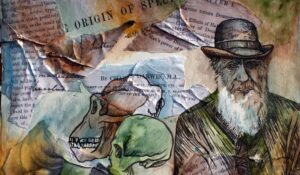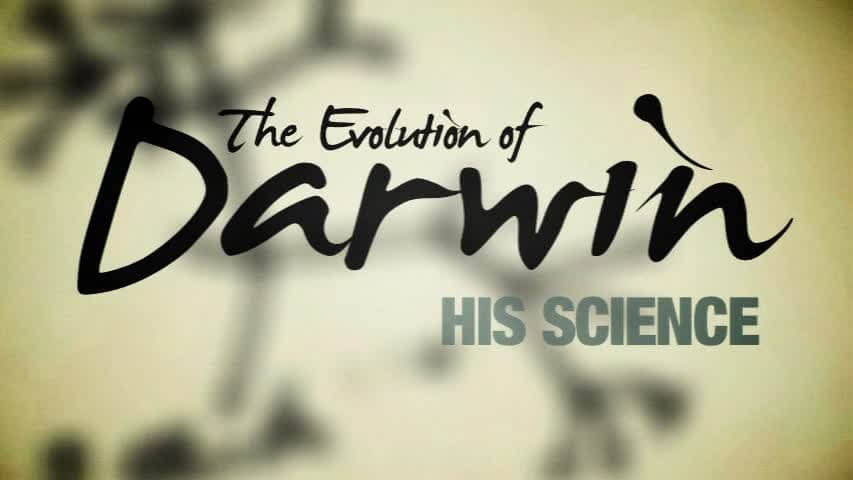AD 2009 marks the 200th anniversary of Darwin’s birth in 1809 and the 150th anniversary of the unveiling of his theory of evolution by the publication of his book,The Origin of Species, in 1859. Belief in evolution as though it were fact proven beyond doubt is surely the greatest single cause of the disastrous decline in belief in God, the Bible and the Christian faith during the 19th – 21st century. Rom 1:25 refers to those “who changed the truth of God into a lie, and worshipped the creature more than the Creator.” The evolution theory has proved a formidable weapon in Satan’s hands, which should be of concern to all true Christians who are called upon to “fight the good fight of faith” (1Tim 6:12).
 Over 90 UK organisations have geared up to celebrate Darwin’s bi-centenary and to consolidate their undeniable success in undermining belief in a Creator-God since the publication of The Origin of Species. However, the atheistic evolutionists are not getting it all their own way, since creationist groups have also geared up to meet their challenge, and special meetings, seminars and debates have been organised for 2009 throughout the UK. This is already causing concern to atheists. Indeed, The Independent on Sunday of 1st June 2008 published an article which reported that “the rise of creationism in Britain has spread alarm throughout the scientific community.” The British Museum’s Dr. Bob Bloomfield was quoted as saying that “the statistics in this country are quite frightening. If you add up the percentages that either believe in creationism or intelligent design, it is approaching 40%.” Leading militant atheist Prof. Steve Jones, Professor of Genetics, University College of London, who has had a regular weekly column in The Daily Telegraph for years, is concerned that students are “becoming increasingly vocal in their opposition to evolution.”
Over 90 UK organisations have geared up to celebrate Darwin’s bi-centenary and to consolidate their undeniable success in undermining belief in a Creator-God since the publication of The Origin of Species. However, the atheistic evolutionists are not getting it all their own way, since creationist groups have also geared up to meet their challenge, and special meetings, seminars and debates have been organised for 2009 throughout the UK. This is already causing concern to atheists. Indeed, The Independent on Sunday of 1st June 2008 published an article which reported that “the rise of creationism in Britain has spread alarm throughout the scientific community.” The British Museum’s Dr. Bob Bloomfield was quoted as saying that “the statistics in this country are quite frightening. If you add up the percentages that either believe in creationism or intelligent design, it is approaching 40%.” Leading militant atheist Prof. Steve Jones, Professor of Genetics, University College of London, who has had a regular weekly column in The Daily Telegraph for years, is concerned that students are “becoming increasingly vocal in their opposition to evolution.”
Darwin became an agnostic
 lieve in the Bible as a divine revelation and therefore not in Jesus Christ as the Son of God.” But later, in 1879, he claimed that he had “never been and atheist in the sense of denying the existence of God… I think that an agnostic would be the more correct description.”
lieve in the Bible as a divine revelation and therefore not in Jesus Christ as the Son of God.” But later, in 1879, he claimed that he had “never been and atheist in the sense of denying the existence of God… I think that an agnostic would be the more correct description.”
Publish and be condemned?
 hat he wrote of his fear that “I have devoted my life to a fantasy… and a dangerous one.” His book was published in November 1859 under the full title: On the Origin of Species by means of Natural Selection. Though mankind was scarcely mentioned in his book the press and readers were not slow to realise the implications for the origin of humanity.
hat he wrote of his fear that “I have devoted my life to a fantasy… and a dangerous one.” His book was published in November 1859 under the full title: On the Origin of Species by means of Natural Selection. Though mankind was scarcely mentioned in his book the press and readers were not slow to realise the implications for the origin of humanity.The reviews were mixed, but the atheists rejoiced in its publication. As expected, it led to prolonged controversy and the battle still rages unabated today, and will continue to do so as part of the age-old battle between God and Satan, good and evil, truth and error, until Satan’s final doom prophesied in Revelation 20:10.
A happier ending?
 d retired and come to live in Downe. As Darwin was regarded as the villagers’ squire, he would have quickly become acquainted with the new arrivals, who told him of the work of their son, James. Since Darwin’s grandmother and great-grandmother had both died from alcoholism, he had such a horror of drink that he constantly warned his sons against it and, as a county magistrate for 25 years, had long been concerned about alcoholism and its harmful effects.
d retired and come to live in Downe. As Darwin was regarded as the villagers’ squire, he would have quickly become acquainted with the new arrivals, who told him of the work of their son, James. Since Darwin’s grandmother and great-grandmother had both died from alcoholism, he had such a horror of drink that he constantly warned his sons against it and, as a county magistrate for 25 years, had long been concerned about alcoholism and its harmful effects.When James Fegan visited his parents, since he was a leading figure in the Temperance Movement, Darwin seized the opportunity to ask the evangelist for his help in dealing with this problem in his local area. He later said in a letter to James: “Your services have done far more for the village in a few months than all our efforts for many years. We have never been able to reclaim a drunkard.”
Lady Hope’s visit
 One of Darwin’s biographers, James Moore, wrote of her evangelical work: “In pubs and school rooms, cottages and castles, she preached and prayed and read the Bible, with drunkards, the destitute, and the dying.” When Lady Hope conducted meetings near Downe she was invited by Charles Darwin to come and see him. Many years later, after she had emigrated to the USA, she wrote about this visit:
One of Darwin’s biographers, James Moore, wrote of her evangelical work: “In pubs and school rooms, cottages and castles, she preached and prayed and read the Bible, with drunkards, the destitute, and the dying.” When Lady Hope conducted meetings near Downe she was invited by Charles Darwin to come and see him. Many years later, after she had emigrated to the USA, she wrote about this visit:“It was one of those glorious autumn afternoons that we sometimes enjoy in England… Charles Darwin was almost bed-ridden for some months before he died… As the door was opened on the landing upstairs, I saw him lying on a sofa beside a very fine bay window, which overlooked a most extensive view of cornfields, gardens and scattered cottages which glowed in the light of one of those marvellous sunsets which are the beauty of Kent and Surrey… His magnificent open forehead, crowned with white hair, the earnest almost intense look in his eyes, and his pleasing expression impressed me greatly. He had a large book open in front of him – it was a Bible. Raising his hand, he said emphatically: ‘This is the Epistle to Hebrews; the Royal epistle I call it. Isn’t it so? And oh, this Book, this Book, I never tire of it.’ And he began to comment on some of the great Gospel truths… He spoke of Christ in this way: ‘He is the King, the Saviour, the Intercessor, dying, living.’
“I asked, ‘But what about Genesis, the very first book in the Old Testament? Your name is always associated in one’s mind with certain doubts about that history – the creation – I mean your views?’ Here his whole aspect changed. A look partly of anger, and partly of great distress, was on his face. As he closed his hands, throwing them forward, while he said with a sort of groan or sigh: ‘I was young then. I was ignorant, I was enquiring, searching, trying for knowledge, I wanted the truth and there… and then…’ He hesitated, as if he was quite overcome, and burst out with a louder voice, apparently in great displeasure, ‘They went and made a religion out of it.’ He sank back quite exhausted after his outburst, and closed his eyes. Then we talked again quietly.
“It was either on this occasion, or another about the same time, that he suddenly turned and said to me with a bright smile: ‘Have you been in my garden? No? Then you have not seen my summer house. It is quite a large one. I should think it would hold about thirty people. Now, I want to know if you would have a meeting there and talk to my people. You see there are servants and labourers and some tenants, for there are farms on the estate; and then there are all my neighbours. Would you be willing to do this for me? … I cannot go myself, but this window would be open, and I can hear them all.’ There was such an animated, earnest expression on his face when he said this. ‘What shall I speak on,’ I asked. ‘Oh, on the Lord Jesus Christ and His salvation’ he answered most earnestly. Of course I was willing indeed but it never took place. I feel sure there was a lack of sympathy on these lines in the house.
” It was very courageous of Lady Hope to raise the issue of his views on creation. Does his reaction suggest he had changed his mind? Some ask why she left it so long before speaking about her visit. Moore says: “There is no doubt that Lady Hope was making comments about Darwin to her religious friends long before the story was published.” She may not have agreed to her story being published until long after Darwin’s death to avoid embarrassment to unsympathetic family members. His four sons were all evolutionists and free-thinkers who jealously guarded their father’s fame.
An indication of Darwin’s possible change of heart is that a month after his death a Mr. Huntington, a preacher of Tenby, South Wales, said that Darwin in his last utterances confessed his true faith. There is also the testimony of Mr. A.H. Nicholls, a former Downe village postman who was converted under James Fegan in 1881. He was closely acquainted with the servants of Darwin’s household who had nursed him through his final illness. He said that the lady who had nursed Darwin had informed him that he requested her to read the New Testament to him, and asked her to arrange for the Sunday School children to sing: There is a green hill far away outside a city hall where the dear Lord was crucified, who died to save us all. He died that we might be forgiven; He died to make us good, that we may go at last to heaven, saved by His precious blood. This was done and Darwin, who was greatly moved, said: “How I wish I had not expressed my theory of evolution as I have done.”
It may be that Darwin, like many of our wise men, found the simple Gospel of Jesus Christ more satisfying than evolution. Charles Darwin fell seriously ill on 15th April 1882, but assured Emma that he was not in the least afraid to die. Near the end, and in pain, he cried out, “Oh Lord God!” and died in Emma’s arms on 19th April – six months or so after Lady Hope’s visit.
Darwin’s legacy
Biographer James Moore wrote in The Darwin Legend: “For his reticence, his character, and his epoch making science, Darwin was accorded Britain’s highest posthumous honour. Passed over for a knighthood, in April 1882 he achieved immortality: his remains were interred with religious pomp in the nation’s most hallowed sanctuary, Westminster Abbey. Priests gathered at the graveside, and politicians of all parties, as well as Huxley and his allies. They were paying their dues, for Darwin had delivered nature and human destiny into their hands. Evolution was respectable now… Professional scientists were usurping the priests… Society would never be the same. A Devil’s Chaplain had  done his work.”
done his work.”
Other triumphalist comments were heard, such as: “The church has Darwin’s corpse, but that is all she can boast. She has not buried Darwin’s ideas. They are still at work, sapping and undermining her very foundations.” Edward Aveling, a militant atheist and son-in-common-law of Karl Marx, declared: “All Freethinkers hail Darwin as a brother and an ally” and added that Darwin would always be working with their cause of atheism. God’s word says: “The fool hath said in his heart, there is no God” (Psa 14:1).
Emma’s fear, after they married, that Charles’s work was leading him into perilous waters, proved to be so right. It is surely safe to say that had Darwin: (a) been aware that the fossil evidence he anticipated would not materialise; (b) realised the immense significance of the quite staggering complexity of living things that has since been revealed; and (c) foresaw the awful consequences of applying the evolutionary principle of the survival of the fittest and the law of the jungle to human affairs, as in Marxism and Nazism, with its colossal loss of human life, he would have realised how disastrously wrong he was and would not have published his unproven theory! No wonder he feared that he had devoted his life to a dangerous fantasy and described his book as accursed.
We cannot be sure that Charles repented and was converted at the end, but we are sure that God is “not willing that any should perish, but that all should come to repentance” (2Pet 3:9). The only way to heaven is by “repentance toward God and faith toward our Lord Jesus Christ” (Act 20:21), and only “the Lord knows those who are His” (2Tim 2:19). Since Darwin’s evolution has been, and still is being used by Satan and atheists to undermine faith in God, we could only be sure he had repented and was converted if he had been able to issue a public statement confirming it. For all we know, he may have said so verbally at the end, but some of his family (e.g. his sons) would not have wanted it to be made public because it would have damaged his famous image. He could have repented and trusted Christ for salvation in his heart at the end, only telling Emma, or no one.
We can only hope that despite the enormous damage done by his theory, through the exceeding mercy and grace of God, Darwin did indeed sincerely repent and was truly converted to Christ at the eleventh hour – just like the dying thief on the cross beside Him, or like Saul who became Paul despite the serious harm he had done to the cause of Christ. Nor should we underestimate the influence upon him for good of his devoted, selfless, long-suffering, godly wife, Emma, her faithful Christian witness to him, her loving appeals to him and her prayers for him during their marriage – especially as she cared for him and watched over him during his final illness.
Whether or not he is now in heaven, Darwin’s legacy is still with us, and atheists have taken full advantage of the openings this theory has given them to exploit – using it to cast doubt on God’s existence, the truth of the Bible and the Christian Gospel. The Bible warns that those who do not believe the truth of God’s Word are in danger of being deceived by “strong delusion, that they should believe a lie” (2The 2:11). Satan’s motives are twofold: (1) to rob God of the glory for His marvellous creation; and (2) to rob humankind of the dignity of having been created in God’s image, and the comfort of knowing Christ as Saviour, the Holy Spirit as Comforter, God the Father as our heavenly Father in this life, and the hope of enjoying eternal life with them in the glory of heaven hereafter.
 Our Lord Jesus Christ, the Word, the great, self-existent I AM, is specifically named as the Creator, for “all things were created by Him, and for Him (Col 1:16) and “without Him nothing was made” (Joh 1:1-3). Satan’s aim is to rob Him of the glory for His magnificent, brilliantly-designed creation and great salvation. But Christians look “for the blessed hope and glorious appearing of our great God and Saviour Jesus Christ” (Tit 2:13). Satan’s doom will be sealed following Christ’s millennial reign as King of kings and Lord of lords (Rev 19 and 20). To Him as divine Creator, Saviour and King be all the glory, both now and for all eternity.
Our Lord Jesus Christ, the Word, the great, self-existent I AM, is specifically named as the Creator, for “all things were created by Him, and for Him (Col 1:16) and “without Him nothing was made” (Joh 1:1-3). Satan’s aim is to rob Him of the glory for His magnificent, brilliantly-designed creation and great salvation. But Christians look “for the blessed hope and glorious appearing of our great God and Saviour Jesus Christ” (Tit 2:13). Satan’s doom will be sealed following Christ’s millennial reign as King of kings and Lord of lords (Rev 19 and 20). To Him as divine Creator, Saviour and King be all the glory, both now and for all eternity.(This article is an abridged version of the one published in two parts by the Prophetic Witness magazine of February and March 2009. The main emphasis of the article is on disputed statements about Darwin’s spiritual change of heart during the latter part of his life – Ed).




